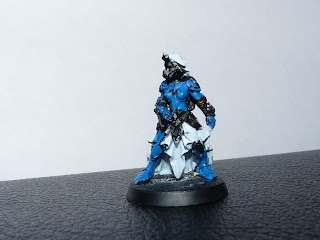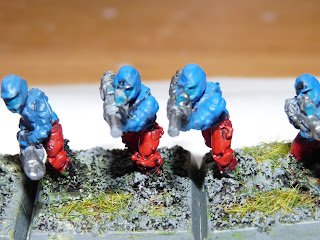As part of my new pledge to spend at least an hour or so painting a day, I've been working on my Sister Hospitaller model. I've liked the idea of the Sisters Hospitallers ever since I read about them in the second of Graham McNeill's Ultramarines book, Warriors of Ultramar. Unlike the Sisters of Battle, the Sisters Hospitaller don't actually fight, they tend to the wounded instead. Okay, so occasionally they help the Inquistion torture someone, but we all know that if you're hauled before the Inquistion, you've done something wrong don't we?
Anyway I've always liked the model and was delighted when I found one amongst the great number of Battle Sister and Inquistion models I bought in 2011/2012 (I have a memory like a sieve). It sums up the nature of the Sisters Hospitaller and the universe they're a part of perfectly, with the robes conveying a gentle aspect, but with the rebreather mask and little bone saw on the right arm still likely to scare the crap out of anyone unlucky enough to need their services.
Now for my model, I'd planned to go with a tradtional nurse's white for the robes, and a light blue for the armour. This latter choice was inspired by the blue nurse's uniforms you get in Britain and I wanted to give the model a bit of national flair, but more on that later.
Painting white has always been tricky. Being such a light colour, it's really hard to acheive a good, consistent look, since anything underneath will show through unless you've got enough layers on. Some people manage to simply use a white undercoat and then build it up from there, but when I've tried to copy them, the results have been mixed. Using a white spray paint simply leaves a dirty looking model that requires a lot of work, almost as much as if you hadn't bothered with the spray paint in the first place, as you can see below:


Admittedly I'm not sure if I was holding the spray paint too close or not but the experience was enought ot put me off ever trying to use a white spray paint again and currently the can is sitting, unused, on one of my shelves. My other attempts to use a white undercoat, made much earlier in my painting 'career' involved simply applying layer after layer of skull white to first a Rhino (it was suppossed to be for the Imperial Fists) and then some Vanguard Veterans.
Well the Rhino ended up looking much like the Dreadnaught above (it looked even worse after I tried painting yellow but let's not go there) while the Vanguard Veterans taught me something about Science. You see, whatever materials were in the paint and the composistion of the metal, combined to react by turning the models pink. I'm not joking, almost as soon as the white paint was applied to the metal, the affected area began to turn a bright candyfloss pink in hue.
Sadly I didn't take any pictures, because the result was hilarious. In the end the Veterans received some yellow paint, which ended up fading because I left them in the Sun for so long. It was in the end, a waste of a fair bit of money even if it did teach me not to use a white undercoat.
Therefore, using a black undercoat as my starting point, I have to start with a dark to mid-grey when painting white. Before the new Citadel paints were released, my preferred colour was a Fortress grey with one or two coats, followed by Space Wolves grey with another one or two coats. Unfortunately my prolonged absence from painting has seen my remaining supply of Fortress grey dry up, so I've had to go straight to the Space Wolf grey stage on my Sister Hospitaller.
I've already given her three coats of Space Wolf grey, but a fourth is needed, possibly a fifth as well. I'm painting with the figure already stuck to the base, which after seen umpteen painting sites where the models are mounted on sticks to give access to the underside, I'm going to have to try and emulate. However with the model already on the base, there are plenty of bits I've missed with the initial coats.
This is a particular problem for me and is, in large part, responsible for my lack of neatness. It's a problem that tend to be excerabated by my tendency to rush painting a model. It's also I'm determined not to have for this model, since it's so well detailed that it deserves at the very least a decent paint job.
For the blue, meanwhile, I've started with the old Enchanted blue as the intial layer, with one coat applied. I'll add one more before moving on to Lothern blue as the mid layer. However that isn't quite light enough for what I want so I'm going to switch to Privateer Press's Formula P3 range for the final colour. In this case it'll be Arcane blue, which hopefully will be close enough to the sky blue look I want and not end up looking too much like turquiose.
Spot colours will be a straightforward metal for the bonesaw and attached mechanism, with a red for some of the little plates on the armour. I'll try for a gold or bronze on the small fleur-de-lys symbols, but I'll need a new detail brush for that. Till then I've leave you with some little work in progress shots:





















